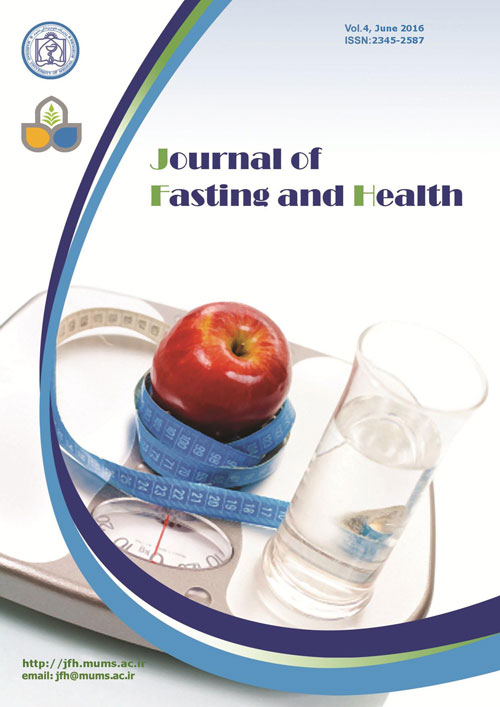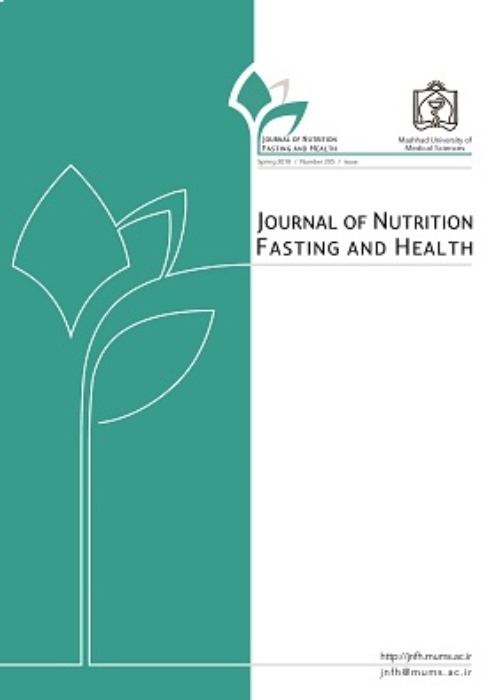فهرست مطالب

Journal of Nutrition, Fasting and Health
Volume:4 Issue: 2, Spring 2016
- تاریخ انتشار: 1395/06/18
- تعداد عناوین: 8
-
-
Pages 53-56One of the basic rituals of Islam is fasting during Ramadan. In this month, all able-bodied Muslims abstain from food, fluids, smoking, and oral medications from sunrise to sunset. According to the Quran, if fasting poses major health risks to individuals, fasting during this holy month is not allowed. This study aimed to evaluate the effects of fasting on maternal and fetal health. Therefore, we investigated studies in three different areas, including fetal growth and development, intrauterine and early-life conditions, and laboratory findings. According to the results, fasting had no significant effect on pregnant and healthy women. However, further studies should be conducted in this area in order to obtain more comprehensive and accurate results. Furthermore, it is suggested that healthy pregnant women be monitored by physicians during fasting.Keywords: Ramadan, fasting, Pregnant woman
-
Pages 57-63IntroductionFasting is an Islamic practice, which causes various metabolic changes in fasting individuals. Numerous studies have examined different aspects of fasting, but its effect on individuals with different characteristics such as obesity has remained unknown. The impact of fasting on adipose tissue hormones such as leptin and adiponectin is still controversial. In this study, we aimed to examine the effect of Islamic fasting on glucose and lipid profiles, as well as plasma adiponectin and leptin concentrations in fasting obese and normal-weight individuals.Materials And MethodsObese and normal-weight individuals from Yazd, Iran, who fasted during Ramadan were divided into two groups (n=24). Blood samples were taken from all the participants after 10-12 fasting hours two days before and one day after Ramadan to assess glucose and lipid profiles and plasma adiponectin and leptin concentrations. The individuals who were not able to fast for at least 21 days due to inflammatory or infectious diseases and those who received oral medications or supplements during Ramadan were excluded from the study.ResultsVariations in weight, body mass index (BMI), total cholesterol, high-density lipoprotein cholesterol (HDL-c), the ratio of total cholesterol to HDL-c were significant in the obese group (PConclusionIslamic fasting can prevent cardiovascular diseases in obese and normal-weight individuals through reducing weight, BMI, and some blood lipids, elevating HDL-c level, and changing the concentration of some adipokines.Keywords: Islamic fasting, Adiponectin, Leptin, Lipid profile, Body Mass Index
-
Pages 64-69Considering the emphasis of Islam on the importance of fasting, Muslims attempt to fast from dawn until sunset during the holy month of Ramadan. Fasting is associated with several benefits for normal and healthy individuals. However, it could pose high risks to the health of diabetic patients due to certain physiological changes. This study aimed to compare the physiological changes associated with fasting in healthy individuals and diabetic patients during Ramadan. Furthermore, we reviewed the domestic articles published in this regard.Keywords: fasting, Ramadan, Diabetes
-
Pages 70-74Most Muslims fast during the holy month of Ramadan. Patients with thyroid diseases do not normally need medication adjustment and are able to fast safely. On the other hand, hypothyroid patients are prescribed with thyroxine tablets, which should be taken on an empty stomach at bedtime or half an hour before Sohur. Hyperthyroid patients receiving treatment with methimazole or carbimazole have to adjust to 1-2 daily doses, while patients using propylthiouracil need to change their drug regimen. Severely symptomatic hyperthyroid patients require immediate treatment and must avoid fasting for a few days. Since adrenal insufficiency might be life-threatening, proper education is essential for these patients if they are willing to fast in Ramadan. In this regard, the educational content should be focused on the disease, proper medication, alarming signs and symptoms, sick day rules, dietary regimen, and physical activity.Keywords: Ramadan, Hyperthyroidism, Hypothyroidism, Adrenal insufficiency, Sick day rules
-
Pages 75-76Muslims all over the world fast in the holy month of Ramadan. Fasting means abstinence from drinking any liquids, eating, smoking and taking anything parenterally. It is intermittent in nature from the start of dawn to end at dusk. Fasting has various physiological effects on different biological parameters of the human body. Previous studies that look at effect of Ramadan fasting on blood pressure have focused mainly on hypertensive patients and patients with already established heart disease.(1,2)There is very limited data regarding the effect of fasting on the normal population. (3,4) A few previous studies have advocated a hypotensive role of fasting.(5)
In our study published in Journal of Ayub Medical College Abbottabad (JAMC) in 2015, Effects of Ramadan Fasting on Blood pressure in normotensive males, we investigated the effect of Ramadan fasting on blood pressure of normotensive men. We conducted a repeated measure observational study in Karachi, Pakistan on 70 individuals who were normotensive, non-smokers between the ages of 1850 years. . Blood pressure, pulse, BMI of each participant was recorded one week before the start of Ramadan and in the first, second and third week of Ramadan.
The results of our study show that intermittent fasting has a hypotensive effect in normotensive males as proven in animal models and certain human population. There was an average drop of 8/3 mmHg and while the results are significant, their clinical relevance needs to be analysed.
Studies on animal models have suggested atrial natriuretic peptide, catecholamines, opiates and body mass index as possible reasons for the decrease in blood pressure due to fasting.(3, 6) Dewanti et al suggested that the cause of drop in blood pressure was the drop in BMI however in our study we found that a drop in BMI only occurred before Iftar towards the end of the fast. There was no significant drop in post-Iftar BMI although there was a significant drop in blood pressure post-Iftar. At the same time ANP has been investigated and found to have no relationship with the phenomenon. We observed a drop in both pre and post Iftar period blood pressure readings. From the community health perspective these results cast doubt on the results of screening for hypertension in the month of Ramadan.
Our study has some limitations. First of all, our results cannot be generalized to women and individuals suffering from chronic diseases. Secondly, one cannot exclude the confounding effect of the type of food taken during the breaking of the fast for example individuals taking stimulants like coffee and tea might have yielded readings that were confounded. -
May be prepared our bodies during a year to tolerate fasting Ramadhan more comfortably? Imam Reza's health and nutritional recommendations concerning different months of year(Ahead of publication)Pages 77-81During different months of the year various weather conditions (such as atmospheric pressure, wind, temperature, moisture, heat) appear to be dominant. These variations influence almost all organisms including human body and his soul. Nutritional diet is one factor which can lead to human adjustment with atmospheric changes.
Imam Reza) eighth Imam of Shiite( however, has offered the most perfect and thorough recommendations concerning different months and atmospheric changes.
we reviewed and highlighted these recommendations.Keywords: Imam Reza's Recommendations, recommendations concerning different months, Nutritional recommendations -
Pages 82-87Sodium-glucose co-transporter 2 (SGLT2) inhibitors are a new glucose-lowering therapy for T2DM with documented benefits on blood glucose, hypertension, weight reduction and long term cardiovascular benefit. They have an inherent osmotic diuretic effect and lead to some volume loss and possible dehydration. There is some concern about the safety of using SGLT2 inhibitors in Muslim type 2 diabetes mellitus (T2DM) patients during the fast during Ramadan. Currently, there is a dearth of research data to help guide physicians and reassure patients. One study confirmed good glycemic control with less risk of hypoglycemia and no marked volume depletion. Data in the elderly and in combination with diuretics are reassuring of their safe to use in Ramadan in general. SGLT2 inhibitor-related diabetic ketoacidosis has not been reported during Ramadan and is unlikely to be relevant. Survey of physicians revealed that the majority felt that SGLT2 inhibitors are generally safe in T2DM patients during Ramadan fasting but should be discontinued in certain high risk patients. Some professional groups with interest in diabetes and Ramadan fasting included SGLT2 inhibitors in their guidelines on management of diabetes during Ramadan. They acknowledged the lack of trial data, recommended caution in high risk groups, advised regular monitoring and emphasized pre-Ramadan patients education. In conclusion, currently, knowledge, data and experience with SGLT2 inhibitors in Ramadan are limited. Nonetheless, stable patients with normal kidney function and low risk of dehydration may safely use the SGLT2 inhibitors therapy. Higher risk patients should be observed carefully and managed on individual basis.Keywords: SGLT2 inhibitor_Type 2 diabetes mellitus Type 1 diabetes_Canagliflozin_Dapagliflozin_Empagliflozin_Non_glycemic benefit of SGLT2 inhibitors_Blood pressure_Elderly_Dehydration_Diuretics_Volume depletion_Ketoacidosis_Ramadan fasting_Ethnicity
-
Evaluation of the effects of Islamic fasting on the biochemical markers of health. (Ahead of Publication)Pages 88-95IntroductionRamadan is the ninth month of the lunar Islamic calendar, during which Muslims are obliged to perform specific rites and rituals. Fasting is considered the most important ritual during the holy month of Ramadan. Fasting variably influences the health of individuals, which could be attributed to the changes in the concentrations of certain biochemical markers. This study aimed to elucidate the health effects of fasting through evaluating the impact of this Islamic duty on blood biochemistry.Materials And MethodsThis quasi-experimental study was conducted on 40 male volunteers employed at North Khorasan University of Medical Sciences, Iran.Data collection and phlebotomy were performed before fast breaking(Iftar) on the first and last day of Ramadan. Fasting duration was 11 hours per day. Serum biochemical factors, including blood glucose, uric acid, albumin, low-density lipoprotein(LDL), high-density lipoprotein (HDL), total cholesterol and triglyceride(TG), were measured in all the participants at the beginning and end of Ramadan. Data analysis was performed in SPSS using paired-samples T-test to compare the mean variables.ResultsMean age of the participants in this study was 39.11±8.602 years. After one month of fasting, a significant reduction was observed in the mean levels of blood glucose, uric acid, TG, and LDL(PConclusionAccording to the results of this study, Ramadan fasting could lower blood cholesterol and uric acid, while enhancing the level of albumin in healthy adults.Keywords: fasting, Lipid profile, Uric acid, Albumin


